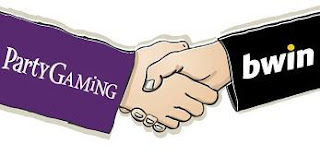The UIGEA: 10 Years Ago Today
In July 2006 this blog was only three months old. A lot of my posts to that point had been about playing poker -- online poker, that is. Not unlike many of the other hundreds of poker blogs at the time. Occasionally I’d write about other things -- hard-boiled novels, for instance -- as well as other poker-related topics emanating from “the rumble.”
I did notice that month the passage of a bill in the U.S. House, something called the “Unlawful Internet Gambling Enforcement Act,” and wrote a post here at the time about it titled “Raising a Glass to the Return of Prohibition.” I can’t honestly say that when writing that post I was all that concerned about my ability to play online poker being curbed at all, though.
One reason why I wasn’t so worried was the fact that the bill the House had passed wasn’t the much harsher seeming “Internet Gambling Prohibition Act,” the one certain legislators had been working over for the previous decade or so. Rather the “UIGEA” -- the acronym some of us would become very familiar with (and others consistently screw up) -- was only focused on credit card companies and financial transaction providers, meaning playing online poker wasn’t a problem. And, well, getting money to and from the sites didn’t seem like it would be a problem, either, or at least all that seemed too abstract at the time to bother us.
Besides, the sucker still had be passed by the Senate, then signed by the president. And pretty much everyone in the poker world who’d actually been following these attempts at legislating online gambling were predicting that wouldn’t happen.
We made it to the end of September 2006, then woke up one Saturday morning to realize the unthinkable had happened. The UIGEA had been snuck onto another piece of legislation and passed through the Senate with hardly any resistance at all. I wrote a post that morning titled “Deals in the Dead of Night” remarking on the event, still naively occupying a position of only moderate concern.
I noted at the time how it was already a given that then-president George W. Bush would sign the bill into law, but could only muster the opinion that “then things should get more interesting” once he did.
I’m remembering the following two weeks. It was that Monday, October 2nd, that PartyPoker (now styled “partypoker”) announced it would be cutting off the Americans. Somewhere mid-week I remember having a phone conversation with Party support and having it confirmed that yes, indeed, I would have to withdraw my funds as I wouldn’t be able to play on the site once the bill became law.
Like everyone else I began to wonder if all the other sites would follow suit, but both PokerStars and Full Tilt Poker were quick to confirm they wouldn’t be pulling out of the U.S. It all seemed a lot more uncertain, then, as we got the news that week that the UIGEA would be signed by Bush the following Friday the 13th, a suitably ominous-seeming day for the event.
We got to October 13, 2006, and while sitting at a desk with a banner reading “Securing the Homeland” Bush indeed signed the “SAFE Port Act” into law. In his comments Bush spoke of how the law “will make this nation more prepared, more prosperous, and more secure.” He went on to thank various legislators, reiterate the importance of protecting Americans from terrorism and making our borders and seaports secure, and winning the “war on terror.”
In his comments Bush didn’t mention the internet at all, nor the UIGEA which had been sneakily appended to the bill before its passage. It seemed almost like he might not even be aware of it.
Some of us were aware of it, though. And gradually more and more of us would become aware of it, especially four-and-a-half years later when Black Friday suddenly occurred as a kind of a belated next step in the UIGEA’s “long game.”
And now, exactly one decade after the UIGEA was signed into law, all of us here in the United States who’d like to play poker online (as they do in much of the rest of the world) are necessarily aware of its consequences -- even if we don’t know the reason why.
Photo: georgewbush-whitehouse.archives.gov
Labels: *the rumble, Black Friday, Full Tilt Poker, George W. Bush, law, online poker, PartyPoker, PokerStars, UIGEA





 and opened with a raise to €700. Tony G called from the small blind with
and opened with a raise to €700. Tony G called from the small blind with 
 , then Andy Moseley reraised to €3,400 from the BB with
, then Andy Moseley reraised to €3,400 from the BB with 
 .
.

 , then the turn brought the
, then the turn brought the  to pair Laak, who didn’t react at all to the card. When asked, Moseley said “I feel like 6 out of 10 comfortable” regarding his prospects at that point with ace-king -- without, of course, knowing that Laak had just binked his six.
to pair Laak, who didn’t react at all to the card. When asked, Moseley said “I feel like 6 out of 10 comfortable” regarding his prospects at that point with ace-king -- without, of course, knowing that Laak had just binked his six.
 , and all waited for Laak to signal whether he’d won or lost. But rather than turn over the winner, Laak just grimaced and mucked his cards!
, and all waited for Laak to signal whether he’d won or lost. But rather than turn over the winner, Laak just grimaced and mucked his cards! 






 , then seeing a flop of
, then seeing a flop of 
 . Horrendous. Can’t wait for the action to get to me so I can let it go.
. Horrendous. Can’t wait for the action to get to me so I can let it go.  . And suddenly I’m interested again . . . .
. And suddenly I’m interested again . . . .
 in the small blind. Two players called, I raised, and the big blind and both limpers called. The four of us then saw a flop of
in the small blind. Two players called, I raised, and the big blind and both limpers called. The four of us then saw a flop of 

 . Now I was already up about 20 BB at this table by simply playing it straight. (Indeed, I don’t think I’d lost a single showdown to this point.) I bet out, planning to let it go should any undesirable action ensue. The big blind folded, as did the first limper. The fellow in late position called, making me think diamond draw, gutshot straight draw, middle pair, or (most likely) King-lousy kicker. The turn was the
. Now I was already up about 20 BB at this table by simply playing it straight. (Indeed, I don’t think I’d lost a single showdown to this point.) I bet out, planning to let it go should any undesirable action ensue. The big blind folded, as did the first limper. The fellow in late position called, making me think diamond draw, gutshot straight draw, middle pair, or (most likely) King-lousy kicker. The turn was the  , now giving me a gutshot. I felt sure I was behind, but bet out anyway, again considering the possibility of letting it go in the face of a raise. Once again, my opponent called. The river was the
, now giving me a gutshot. I felt sure I was behind, but bet out anyway, again considering the possibility of letting it go in the face of a raise. Once again, my opponent called. The river was the  , completing my straight. I bet, he called. I showed my straight. He showed
, completing my straight. I bet, he called. I showed my straight. He showed  .
.


 , and again I bet and the BB called. The river was the
, and again I bet and the BB called. The river was the  and the BB checked once again. I bet my boat, and he called to show
and the BB checked once again. I bet my boat, and he called to show 
 .
.
 and was called all the way by a short stack as the board came
and was called all the way by a short stack as the board came 

 and was a little surprised to see the entire table call it around to me. (I don’t believe we’d had a single family pot since we’d gotten to four-handed.) I checked my option. Looking back, I can say that at the time I didn’t even consider raising here from early position. Perhaps I should have. The flop came
and was a little surprised to see the entire table call it around to me. (I don’t believe we’d had a single family pot since we’d gotten to four-handed.) I checked my option. Looking back, I can say that at the time I didn’t even consider raising here from early position. Perhaps I should have. The flop came  and the SB bet.
and the SB bet.  , pairing the board. I actually liked the look of that card. Didn't seem like WilyWilly would have reraised me before with just bottom pair. So we got it all in. The river was a blank, and Willy turned over
, pairing the board. I actually liked the look of that card. Didn't seem like WilyWilly would have reraised me before with just bottom pair. So we got it all in. The river was a blank, and Willy turned over  for a boat. I was out in 4th, which pays the same as 10th. Zip.
for a boat. I was out in 4th, which pays the same as 10th. Zip.












